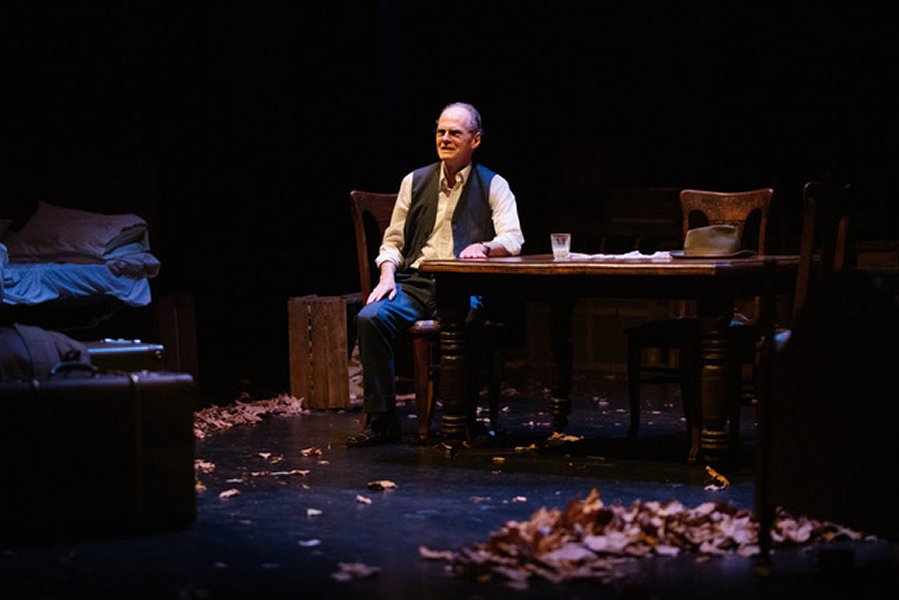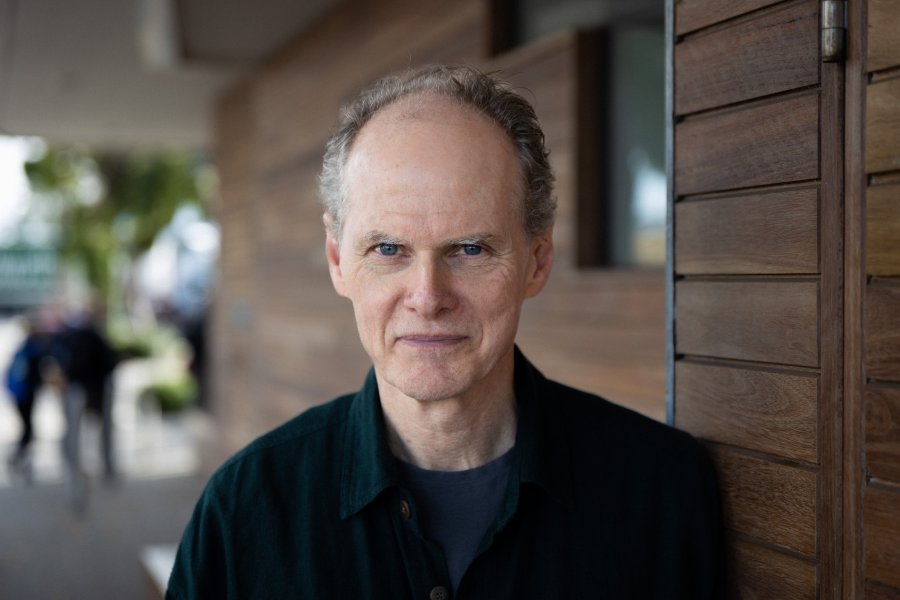The well respected Melbourne Independent Theatre Co. Hearth Theatre, is currently on tour with Arthur Miller’s classic 1949 play Death of a Salesman. Following on from their hugely successful season in 2022 this extraordinary ensemble of Melbourne actors will be playing a strictly limited seasons touring throughout Victoria and New South Wales this year. The titular salesman, Willy Loman, is played by the renowned actor Paul English (ALL MY SONS – Melbourne Theatre Company)
“I was offered the part – and yes, was compelled to be involved,” says English about the iconic and monumental role of Loman. “You don’t turn down this role. The play speaks to us – it’s still alive after 70 years because it embodies truths about how we live.
Charlie Cousins (the founder of Hearth Theatre) and the director Chris Tomkinson wanted to use Mike Alfreds’ rehearsal techniques (inspired by Stanislavski and Laban) – this also interested me.”
The, in many ways, tragic Loman has been played by a plethora of brilliant actors form George C. Scott to Christopher Lloyd. Miller has been quoted as comparing the play’s characters to Greek tragedy – he wanted to show that the common man and those with status had much in common.
English agrees saying that if he stands for anything, Willy’s an Everyman character – a hard worker, battling for his job, his life, his dignity; and also fighting with himself, his insecurities and ideas that obsess him. “There’s something we all recognise in Willy’s desire to leave his mark, to invest his name with substance, and to keep dreaming of better things to come. Anyone can relate to that. It’s a universal story (he was a hit in Beijing in 1985!) and as Miller has said it’s because of his “…wanting to excel, to win out over anonymity and meaninglessness, to love and be loved, and above all, perhaps, to count,” says English.
After living Loman for a while, English admits that he is like an old friend now. “He’s a difficult personality – boastful, abrasive, fragile, mercurial, but also capable of great love and warmth. Miller based him partly on his Uncle Manny, a competitive “bantam of a man” (with “ginger’ Miller says) who never stopped dreaming of wild success for his own son. In fact, when he met Miller backstage after the triumph of All My Sons his first words were “Buddy’s doing very well!!” This scene is mirrored in the play. So I took Manny as my starting point.”
While reality and illusion are prominent themes in the work, English says that the play is a diamond mine of themes, “but two of my favourites are the legacy parents leave their children and the dangers of ideology,” he says. “Miller explores the myths that we cling to that give meaning to our lives: for Willy it is the belief that Capitalism and the open ranks of American society would allow anyone to succeed through hard work; and, arguably, for Biff it is a belief in Agrarian Romanticism. No one in this play has all the answers.”
English goes on to say that the portrait of the Lomans comes from a deep understanding of the family’s dynamics – the ability to nurture and protect as well as smother and deceive; and, as in other Miller plays, this mirrors the wider society and culture. “Particularly of interest to me is Willy’s obsession with the future (while the past bubbles up from his sub-conscious). Miller characterised America as always looking to the future and never dwelling (or examining carefully) the past. He valued the rational analysis of the past, for causality, to understand the present. This resonates hugely for both the U.S. and Australia today.”
As an actor, English admits that one of the greatest challenges for him in finding character was personal.
“I don’t talk all that much. Willy is gregarious, talks all the time, and loudly! That was a challenge and is now, given the long and rigorous rehearsal period, a pleasure. The improvisational aspects of Mike Alfreds’ approach I found freeing, and was interested in the group exploration of character’s objectives and actions which created a sort of collaborative, detailed map of the play.”

Over forty years English’s work with the major companies includes Arcadia (Sydney Theatre Company and national tour), Cabaret, Closer (STC of S.A.), Hamlet (Hole in the Wall W.A.), King Lear (Bell Shakespeare), Good Works, Rapture (Helpmann Award nomination), A Return To The Brink (Playbox), Henry V, As You Like It (NZ’s Pop-up Globe) and over 25 shows for Melbourne Theatre Company, among them Measure for Measure, All My Sons, Mad Forest, No Going Back and Europe. He was a founding member of Melbourne’s acclaimed Keene/Taylor Theatre Project and at Fortyfivedownstairs played Satin in The Lower Depths, the title role in Chekhov’s Ivanov, premiered Do Not Go Gentle, and co-devised and performed, with Helen Morse and violist Isabel Morse, a program of poetry and music The Power of Love. He has performed Stravinsky’s The Soldier’s Tale with Plexus Trio, and also with an ensemble lead by American violin virtuoso Tim Fain for the Canberra International Music Festival. Among Paul’s TV credits are SeaChange, Phoenix, Curtin, Howzat! and Gallipoli.
The play has now toured through Victoria and into New South Wales to accolades and high acclaim. English says that all places have been wonderful in their different ways and audiences have consistently loved it. “My favourite moment so far has been meeting a group of women in their 70s outside the Memorial Hall in Healesville after the matinee madly texting their friends to come and see the evening show. One said she’d studied Salesman at school and only now really understood it. Makes an actor’s day.”
“If the rehearsal period has been rich then the play in performance continues to change and grow.” says English. “It’s the playing that matters. Recently I’ve been more conscious of Willy’s curiosity and the auto-didact in him; and his focus on the concept of ‘fineness.'”
A fortuitous meeting between English and founder of Hearth Theatre, Charlie Cousins, at Patsy Rodenberg’s workshop at 16th Street began the relationship.”With the support of Chris Tomkinson’s fine direction and a dedicated cast, Charlie’s achievement in getting this show up and touring, as well as playing Biff, is phenomenal,” he says.
After the Chapel Off Chapel season next week (7th to 11th June) the show heads to other regional venues in Victoria and NSW. There is now also strong interest from NSW and Queensland venues for a longer tour in 2024.
Do not miss this unforgettable production that had standing ovations every night and critics enthralled…
hearththeatre.com.au
show image: Jack Dixon-Gunn





